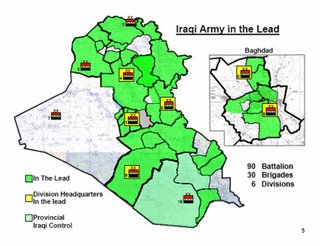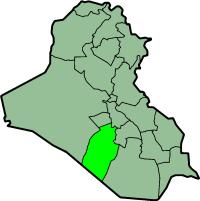The following is a Haider Ajina translation of a headline and article, which appeared in Iraq’s Buratha News on December 14th.
“Iraqi forces ready to take over security responsibility in Nejaf (Najaf) province”
Najaf Province is the third Iraqi province to take over complete control of security operations. Iraqi forces now control 70% of the battlespace.Colonel Ahmed Hussein Abdullah commander of Iraqi security forces in Nejaf Province said that the Iraqi security forces are ready to receive full responsibility of security operations in Nejaf province, from the multinational forces. He added, “The governor of Nejaf province Mr. Asaad Sultan Abu-Kellal visited the USA consulate in Babylon province to prepare for the final steps to transfer security to our forces.” The Colonel pointed out the strong coordination between Nejaf police and the Iraqi Army in the province. The province is enjoying excellent security due to this mutual coordination.
The Colonel spoke about a new police brigade for the city of Hillah, which will protect the city and all the new police stations to be opened throughout the province. This is in addition to Theqar Brigade (under command of the interior ministry) and Saqer (Falcon) brigade (under command of the Iraqi Army), both assigned to Nejaf province.
Dr. Ali Aldabagh spokesperson for the Iraqi government said on Thursday, that security responsibility for Nejaf will be transferred to Iraqi forces from multi national forces on December 20. Dr. Ali Aldabagh added, in a conference held at the conventions palace in Baghdad, “Nejaf province is experiencing calm and security because of the presence of Iraqi security forces. This situation facilitates the transfer of security to Iraqis.”

Najaf Province will be the third of 18 Iraqi provinces to take full control of security operations. Iraqi forces are leading security efforts in a majority of the provinces today. (MNF-Iraq)
Haider Ajina comments:
Our US military has obviously done a good job training Iraqi security forces in Nejaf province. It is one of the calmest provinces with economic activity booming and constantly improving health care etc.
Alqaida and the Baathists have extreme difficulty killing Iraqis or setting off bombs in this province. Because of that, sectarian strife is almost nonexistent in Nejaf. Sunnis, Shiites, Sunni Kurds and Christians live in peace and harmony in this province. This situation is mirrored in Kurdistan (the Kurdish provinces in northern Iraq).
Sectarian violence and strife is prevalent in what is called the Sunni Triangle. This is because Alqaida and the former Baathists (mostly Sunnis) are killing innocent civilians, evicting Shiites from Sunni areas, setting bombs in Shiite neighborhoods and market areas. This is then met with reprisal attacks by Shiite militia.
Alqaida and the Baathist terrorists are further supported by the “Association of Muslim Scholars” (except for its Basra Chapter which broke ranks last week by denouncing the killing of Shiites and all Iraqis) who appear to be the political arm of Alqaida and the Baathists. These activities further undermine the elected Iraqi government and weaken it.
We must decide who our enemy is and who is our friend in Iraq. Most of the attacks against our military in Iraq are carried out by the former Baathists, Alqaida in Iraq, and their sympathizers. These groups are also causing most of the casualties amongst Iraqi civilians. Our continued sympathy with the representatives of the “Association of Muslim Scholars”, due to our Ambassador’s Sunni bias, is hurting our mission, not helping it. Our ambassador Khalil Zad (Strong Sunni separatist) is scheduled to leave Iraq by the end of the month. If you look back, you will notice that much of the escalation in violence in Iraq started shortly after Khalil Zad took over as our ambassador from Negroponte (summer of 2005). Perhaps we will see a decline in violence once our new ambassador takes over and, hopefully, calls for stronger support of our friends and stronger challenge of our enemies. Iraqi papers report that Ryan Crocker, who is our ambassador to Pakistan, will take over our embassy in Baghdad.
Regards
Haider Ajina
Also, the electrical projects continue in Iraq.
Lawk Salih reports:
AN NASIRIYAH, Iraq — The huge consumption of electricity as a result of the large quantity of electrical goods the Iraqi people are buying with their increasing prosperity, combined with the sabotage of power lines, have contributed to Iraq’s challenge of keeping up with electrical demands. Despite those obstacles, the U.S. Army Corps of Engineers (USACE) has made significant progress in improving electrical production and distributing power equitably throughout the country.
“The Babil province has awarded 24 electrical distribution networks and several substation projects in 2006. Ten of these projects have been completed and 14 are still under construction,” he said. Reed believes that every project helps improve the flow of electricity to Iraqis to some degree.
Most projects focus on distributing electricity from one town to another, and to the outlying neighborhoods. Some of these neighborhoods have never had electricity before he said.
“Because of the freedom to purchase the ‘luxury’ items that were not as readily available in the past–such as air conditioners, heaters, refrigerators and microwaves– extra demands have been placed on power grids at an incredible rate over the past three and a half years. Sometimes the power demand exceeds the amount generated, causing brown- and black-outs,” he said.

